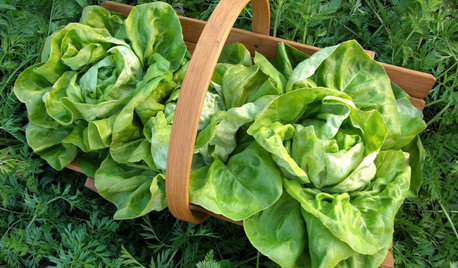Green Manure and Animal Manure questions
hardeng
15 years ago
Related Stories

GARDENING GUIDESThe Poop Scoop: Enrich Your Soil With Good Old Manure
Get over the ick factor already — this natural super-ingredient for soil has so many benefits, you'll wonder why you ever went chemical
Full Story
DOORS5 Questions to Ask Before Installing a Barn Door
Find out whether that barn door you love is the right solution for your space
Full Story
LIFEEasy Green: Modern Homesteaders Stake a Claim
With more options for raising chickens, growing edibles and keeping bees than ever, suburban and city folk are rediscovering a lost art
Full Story
GARDENING GUIDES10 Easy Edibles for First-Time Gardeners
Focus on these beginner-friendly vegetables, herbs, beans and salad greens to start a home farm with little fuss
Full Story
HEALTHY HOMEGet Cleaner Indoor Air Without Opening a Window
Mechanical ventilation can actually be better for your home than the natural kind. Find out the whys and hows here
Full Story
WOODWORKINGBuild Your Own Wooden Deck Chair From a Pallet — for $10!
Take the ecofriendly high road with a low-cost outdoor chair you make yourself
Full Story
EARTH DAYGrow a Beautiful Garden With Ecofriendly Greywater
Reducing home water waste means lower bills and a healthier planet. Here's how to set up a greywater home irrigation system that can help
Full Story
GARDENING GUIDESLush, Foodie Abundance in a Small Urban Garden
This modest backyard garden provides its owner with fruit and vegetables all year round, thanks to an innovative low-maintenance approach
Full Story
GARDENING GUIDESA Mom, a Garden and a Gift for the Neighbors
Gardening can be therapeutic in unexpected ways. See how one gardener found peace and purpose in a patch of Florida soil
Full Story
EDIBLE GARDENSSummer Crops: How to Grow Tomatoes
Plant tomato seedlings in spring for one of the best tastes of summer, fresh from your backyard
Full StoryMore Discussions







Kimmsr
hardengOriginal Author
Related Professionals
Allentown Landscape Architects & Landscape Designers · Forest Park Landscape Architects & Landscape Designers · Marco Island Landscape Architects & Landscape Designers · Quincy Landscape Architects & Landscape Designers · Firestone Landscape Contractors · Gallatin Landscape Contractors · Garland Landscape Contractors · Roswell Landscape Contractors · Tewksbury Landscape Contractors · Baileys Crossroads Landscape Contractors · Merrifield Landscape Contractors · Athens Decks, Patios & Outdoor Enclosures · Greendale Decks, Patios & Outdoor Enclosures · Hialeah Decks, Patios & Outdoor Enclosures · Prescott Decks, Patios & Outdoor Enclosuresfertilizersalesman
Kimmsr
hardengOriginal Author